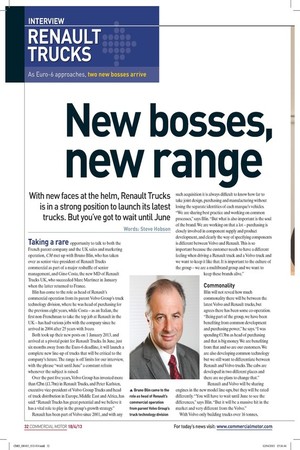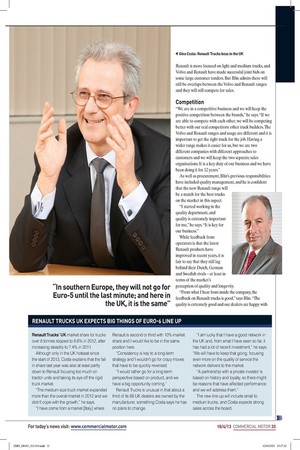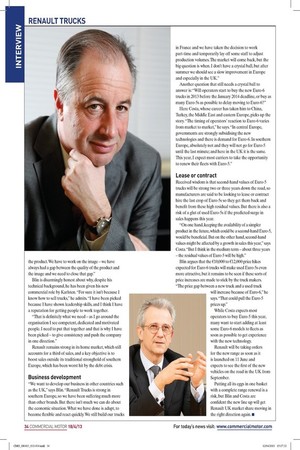New bosses, new range With new faces at the helm,
Page 24

Page 25

Page 26

If you've noticed an error in this article please click here to report it so we can fix it.
Renault Trucks is in a strong position to launch its latest trucks. But you've got to wait until June Words: Steve Hobson Taking a rare opportunity to talk to both the French parent company and the UK sales and marketing operation, CM met up with Bruno Blin, who has taken over as senior vice-president of Renault Trucks commercial as part of a major reshuffle of senior management, and Gino Costa, the new MD of Renault Trucks UK, who succeeded Marc Martinez in January when the latter returned to France.
Blin has come to the role as head of Renault's commercial operation from its parent Volvo Group's truck technology division, where he was head of purchasing for the previous eight years, while Costa — as an Italian, the first non-Frenchman to take the top job at Renault in the UK — has had various jobs with the company since he arrived in 2004 after 25 years with Iveco.
Both took up their new posts on 1 January 2013, and arrived at a pivotal point for Renault Trucks. In June, just six months away from the Euro-6 deadline, it will launch a complete new line-up of trucks that will be critical to the company's future. The range is off limits for our interview, with the phrase "wait until June" a constant refrain whenever the subject is raised.
Over the past five years, Volvo Group has invested more than €2bn (£1.7bn) in Renault Trucks, and Peter Karlsten, executive vice-president of Volvo Group Trucks and head A Bruno Blin came to the of truck distribution in Europe, Middle East and Africa, has role as head of Renault's said: "Renault Trucks has great potential and we believe it commercial operation has a vital role to play in the group's growth strategy." from parent Volvo Group's Renault has been part of Volvo since 2001, and with any truck technology division such acquisition it is always difficult to know how far to take joint design, purchasing and manufacturing without losing the separate identities of each marque's vehicles. "We are sharing best practice and working on common processes," says Blin. "But what is also important is the soul of the brand. We are working on that a lot — purchasing is closely involved in component supply and product development, and clearly the way of specifying components is different between Volvo and Renault:Ibis is so important because the customer needs to have a different feeling when driving a Renault truck and a Volvo truck and we want to keep it like that. It is important to the culture of the group — we are a multibrand group and we want to keep these brands alive."
Cornmonatity Blin will not reveal how much commonality there will be between the latest Volvo and Renault trucks, but agrees there has been some co-operation. "Being part of the group, we have been benefiting from common development and purchasing power," he says. "I was spending €13bn as head of purchasing and that is big money. We are benefiting from that and so are our customers. We are also developing common technology but we still want to differentiate between Renault and Volvo trucks. The cabs are developed in two different places and there are no plans to change that."
Renault and Volvo will be sharing engines in the new model line-ups, but they will be rated differently. "You will have to wait until June to see the differences," says Blin. "But it will be a massive hit in the market and very different from the Volvo."
With Volvo only building trucks over 16 tonnes, Renault is more focused on light and medium trucks, and Volvo and Renault have made successful joint bids on some large customer tenders. But Blin admits there will still be overlaps between the Volvo and Renault ranges and they will still compete for sales.
Competition "We are in a competitive business and we will keep the positive competition between the brands," he says. "If we are able to compete with each other, we will be competing better with our real competitors: other truck builders. The Volvo and Renault ranges and usage are different and it is important to get the right truck for the job. Having a wider range makes it easier for us, but we are two different companies with different approaches to customers and we will keep the two separate sales organisations. It is a key duty of our business and we have been doing it for 12 years."
As well as procurement, Blin's previous responsibilities have included quality management, and he is confident that the new Renault range will be a match for the best trucks on the market in this aspect.
"I started working in the quality department, and quality is extremely important for me," he says. "It is key for our business."
While feedback from operators is that the latest Renault products have improved in recent years, it is fair to say that they still lag behind their Dutch, German and Swedish rivals — at least in terms of the market's perception of quality and longevity.
"From what I hear from inside the company, the feedback on Renault trucks is good," says Blin. "The quality is extremely good and our dealers are happy with the product. We have to work on the image — we have always had a gap between the quality of the product and the image and we need to close that gap."
Blin is disarmingly honest about why, despite his technical background, he has been given his new commercial role by Karlsten. "For sure it isn't because I know how to sell trucks," he admits. "I have been picked because I have shown leadership skills, and I think I have a reputation for getting people to work together.
"That is definitely what we need — as I go around the organisation I see competent, dedicated and motivated people. I need to put that together and that is why I have been picked — to give consistency and push the company in one direction."
Renault remains strong in its home market, which still accounts for a third of sales, and a key objective is to boost sales outside its traditional stronghold of southern Europe, which has been worst hit by the debt crisis.
Business development "We want to develop our business in other countries such as the UK," says Blin. "Renault Trucks is strong in southern Europe, so we have been suffering much more than other brands. But there isn't much we can do about the economic situation. What we have done is adapt, to become flexible and react quickly. We still build our trucks in France and we have taken the decision to work part-time and temporarily lay off some staff to adjust production volumes. The market will come back, but the big question is when. I don't have a crystal ball, but after summer we should see a slow improvement in Europe and especially in the UK."
Another question that still needs a crystal ball to answer is: "Will operators start to buy the new Euro-6 trucks in 2013 before the January 2014 deadline, or buy as many Euro-5s as possible to delay moving to Euro-6?"
Here Costa, whose career has taken him to China, Turkey, the Middle East and eastern Europe, picks up the story. "The timing of operators' reaction to Euro-6 varies from market to market," he says. "In central Europe, governments are strongly subsidising the new technologies and there is demand for Euro-6. In southern Europe, absolutely not and they will not go for Euro-5 until the last minute; and here in the UK it is the same. This year, I expect most carriers to take the opportunity to renew their fleets with Euro-5."
Lease or contract Received wisdom is that second-hand values of Euro-5 trucks will be strong two or three years down the road, so manufacturers are said to be looking to lease or contract hire the last crop of Euro-5s so they get them back and benefit from these high residual values. But there is also a risk of a glut of used Euro-5s if the predicted surge in sales happens this year.
"On one hand, keeping the availability of a simpler product in the future, which could be a second-hand Euro-5, would be beneficial. But on the other hand, second-hand values might be affected by a growth in sales this year," says Costa. "But I think in the medium term — about three years — the residual values of Euro-5 will be high Blin argues that the €10,000 to €12,000 price hikes expected for Euro-6 trucks will make used Euro-5s even more attractive, but it remains to be seen if these sorts of price increases are made to stick by the truck makers. "The price gap between a new truck and a used truck will increase because of Euro-6," he says. "That could pull the Euro-5 prices up."
While Costa expects most operators to buy Euro-5 this year, many want to start adding at least some Euro-6 models to fleets as soon as possible to get experience with the new technology.
Renault will be taking orders for the new range as soon as it is launched on 11 June and expects to see the first of the new vehicles on the road in the UK from September.
Putting all its eggs in one basket with a complete range renewal is a risk, but Blin and Costa are confident the new line up will get Renault UK market share moving in the right direction again. • RENAULT TRUCKS UK EXPECTS BIG THINGS OF EURO-6 LINE UP Renault Trucks' UK market share for trucks over 6 tonnes slipped to 6.6% in 2012, after increasing steadily to 7.4% in 2011.
Although only in the UK hotseat since the start of 2013, Costa explains that the fall in share last year was also at least partly down to Renault focusing too much on tractor units and taking its eye off the rigid truck market.
"The medium-size truck market expanded more than the overall market in 2012 and we didn't cope with the growth," he says.
"I have come from a market [Italy] where Renault is second or third with 10% market share and I would like to be in the same position here.
"Consistency is key to a long-term strategy and I wouldn't go for crazy moves that have to be quickly reversed.
"I would rather go for a long-term perspective based on product, and we have a big opportunity coming."
Renault Trucks is unusual in that about a third of its 66 UK dealers are owned by the manufacturer, something Costa says he has no plans to change. "I am lucky that I have a good network in the UK and, from what I have seen so far, it has had a lot of recent investment," he says. "We will have to keep that going, focusing even more on the quality of service the network delivers to the market.
"A partnership with a private investor is based on history and loyalty, so there might be reasons that have affected performance and we will address them."
The new line-up will include small to medium trucks, and Costa expects strong sales across the board.







































